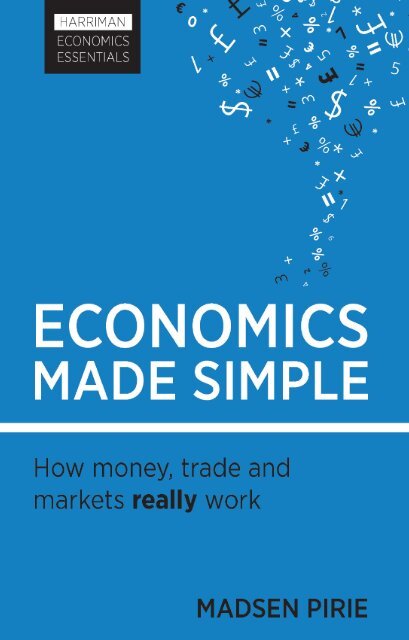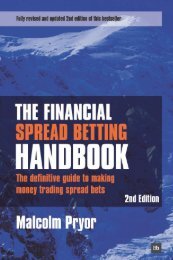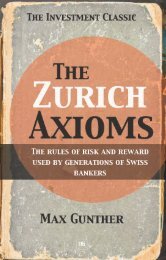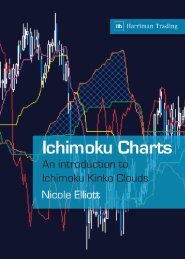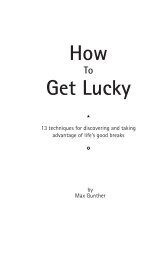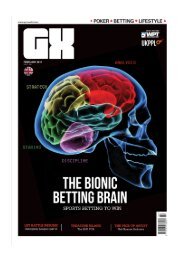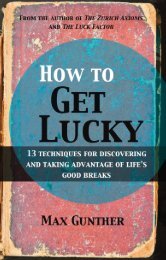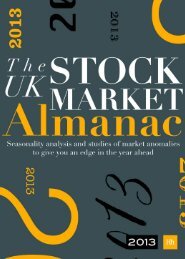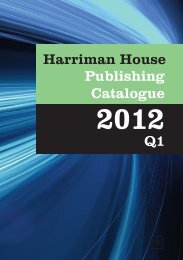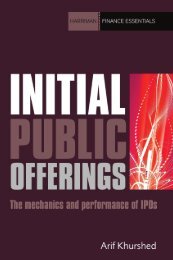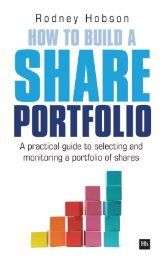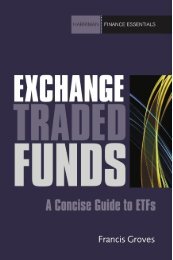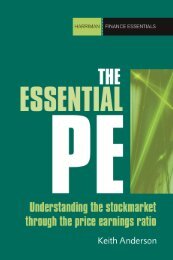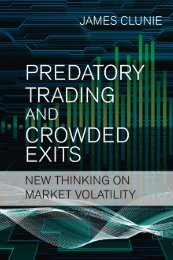Read a PDF Sample of Economics Made Simple - Harriman House
Read a PDF Sample of Economics Made Simple - Harriman House
Read a PDF Sample of Economics Made Simple - Harriman House
You also want an ePaper? Increase the reach of your titles
YUMPU automatically turns print PDFs into web optimized ePapers that Google loves.
XXXXX | CHAPTER X<br />
1
• • • <strong>Sample</strong> • • • •
<strong>Economics</strong><br />
madE simplE<br />
9<br />
1<br />
=<br />
%<br />
*<br />
%<br />
£<br />
€<br />
*<br />
%<br />
*<br />
+<br />
3<br />
£<br />
$<br />
5<br />
£<br />
%<br />
€<br />
8<br />
+<br />
4<br />
3<br />
+<br />
=<br />
=<br />
*<br />
7<br />
* 2<br />
£<br />
%<br />
1 %<br />
$<br />
€<br />
=<br />
$<br />
££<br />
€<br />
£<br />
5<br />
* 4<br />
1<br />
%<br />
+<br />
£<br />
%<br />
+<br />
$<br />
%<br />
4<br />
2<br />
=<br />
=<br />
+<br />
5<br />
£<br />
3<br />
+<br />
*<br />
$<br />
%
<strong>Economics</strong><br />
madE simplE<br />
How money trade and markets<br />
really work<br />
madsEn piriE<br />
$<br />
4<br />
%<br />
2<br />
*<br />
3<br />
%<br />
9<br />
+<br />
%<br />
$<br />
1<br />
=<br />
*<br />
£<br />
£<br />
+<br />
*<br />
*<br />
%<br />
€<br />
£<br />
€<br />
%<br />
£<br />
%<br />
+<br />
+<br />
=<br />
3<br />
££<br />
1<br />
=<br />
5<br />
=<br />
%<br />
+<br />
*<br />
*<br />
4<br />
5<br />
7<br />
=<br />
$<br />
€<br />
£<br />
%<br />
* 2<br />
=<br />
+<br />
4<br />
$<br />
1<br />
%<br />
3<br />
8<br />
%<br />
£<br />
£<br />
5<br />
+<br />
€<br />
$
HARRIMAN HOUSE LTD<br />
3A Penns Road<br />
Petersfield<br />
Hampshire<br />
GU32 2EW<br />
GREAT BRITAIN<br />
Tel: +44 (0)1730 233870<br />
Fax: +44 (0)1730 233880<br />
Email: enquiries@harriman-house.com<br />
Website: www.harriman-house.com<br />
First published in Great Britain in 2012<br />
Copyright © <strong>Harriman</strong> <strong>House</strong> Ltd<br />
The right <strong>of</strong> Madsen Pirie to be identified as the Author has been asserted in<br />
accordance with the Copyright, Designs and Patents Act 1988.<br />
ISBN: 978–0857–1–91427<br />
British Library Cataloguing in Publication Data<br />
A CIP catalogue record for this book can be obtained from the British Library.<br />
All rights reserved; no part <strong>of</strong> this publication may be reproduced, stored in a<br />
retrieval system, or transmitted in any form or by any means, electronic,<br />
mechanical, photocopying, recording, or otherwise without the prior written<br />
permission <strong>of</strong> the Publisher. This book may not be lent, resold, hired out or<br />
otherwise disposed <strong>of</strong> by way <strong>of</strong> trade in any form <strong>of</strong> binding or cover other than<br />
that in which it is published, without the prior written consent <strong>of</strong> the Publisher.<br />
No responsibility for loss occasioned to any person or corporate body acting or<br />
refraining to act as a result <strong>of</strong> reading material in this book can be accepted by the<br />
Publisher, by the Author, or by the employer(s) <strong>of</strong> the Author.<br />
Set in Minion and Gotham Narrow.<br />
Printed and bound in the UK by CPI Antony Rowe.<br />
Hh<br />
<strong>Harriman</strong> <strong>House</strong>
for Tyler Beck Goodspeed
contEnts<br />
ABOUT THE AUTHOR<br />
ACKNOWLEDGEMENTS<br />
ix<br />
xi<br />
introduction: EVERYDAY ECONOMICS 1<br />
1. TRADING THINGS, CREATING WEALTH 5<br />
2. WHAT THINGS ARE WORTH, AND WHEN 17<br />
3. PRICES, SELLING AND BUYING 31<br />
4. PRODUCING AND DISTRIBUTING 45<br />
5. ENTERPRISE 59<br />
6. MONEY AND CURRENCY 73<br />
7. BANKS AND FINANCE 87<br />
8. COMPETITION, MONOPOLIES, AND SETTING THE RULES 97<br />
9. TAXES 111<br />
10. INTERNATIONAL TRADE 127<br />
11. GLOBALISATION AND DEVELOPMENT 137<br />
12. OVERVIEW 147<br />
GLOSSARY 153<br />
INDEX 171<br />
vii
$£<br />
%<br />
€<br />
$<br />
about tHE autHor<br />
=<br />
Dr Madsen Pirie is President <strong>of</strong> the Adam Smith Institute<br />
(www.adamsmith.org) and Senior Visiting Fellow in Land Economy<br />
at the University <strong>of</strong> Cambridge. He was awarded the National Free<br />
Enterprise Award in 2010 (jointly with Dr Eamonn Butler). He<br />
frequently appears as a commentator on television and radio, and<br />
has published articles in most major national newspapers and<br />
magazines. Madsen <strong>of</strong>ten addresses university and school<br />
audiences on economic and policy issues, and occasionally<br />
participates in panel discussions and speaks at international<br />
conferences. He is a graduate <strong>of</strong> the Universities <strong>of</strong> Edinburgh, St<br />
Andrews and Cambridge.<br />
other books by madsen pirie<br />
Think Tank (2012)<br />
101 Great Philosophers: Makers <strong>of</strong> Modern Thought (2009)<br />
Freedom 101 (2008)<br />
How to Win Every Argument: The Use and Abuse <strong>of</strong> Logic (2007)<br />
The Sherlock Holmes IQ Book (with Eamonn Butler) (1996)<br />
Boost Your I.Q. (with Eamonn Butler) (1991)<br />
For young adults<br />
The Emerald Warriors (2011)<br />
Tree Boy (2011)<br />
The Waters <strong>of</strong> Andros (2007)<br />
Children <strong>of</strong> the Night (2007)<br />
Dark Visitor (2007)<br />
www.madsen-pirie.com<br />
ix
%<br />
acknowlEdgEmEnts<br />
6<br />
=<br />
I am most grateful for the help I received in the preparation <strong>of</strong> this<br />
book. Anthony Haynes made invaluable suggestions that made the<br />
book much more user-friendly, while Sam Bowman and Paul<br />
Woods were kind enough to read through early drafts and make<br />
constructive suggestions to improve it. Other much appreciated<br />
help came from Tom Clougherty, Sally Thompson and Jean-Paul<br />
Floru, and from my colleague Eamonn Butler.<br />
Needless to say, any errors, imperfections and inadequacies in this<br />
book lie entirely at my own door.<br />
xi
$<br />
1<br />
£<br />
$<br />
4<br />
9<br />
5<br />
+<br />
%<br />
$<br />
$<br />
introduction<br />
EVERYDAY<br />
ECONOMICS<br />
<strong>Economics</strong> is very much in the news in today’s world.<br />
In ways that would have been inconceivable a half century<br />
ago, we are made aware that much in our daily lives<br />
depends upon economic events. Our standard <strong>of</strong> living, our ability<br />
to afford the things we value, our future prospects, and eventually<br />
our pensions are all influenced by economic activity. Some <strong>of</strong> this<br />
takes place close to home at a personal level, but some events<br />
happen in distant places, set in motion by people we will never<br />
meet.<br />
<strong>Economics</strong> is all around our everyday lives, yet much <strong>of</strong> it seems<br />
opaque and mystifying to ordinary people. Commentators appear<br />
on our screens or in the pages <strong>of</strong> our newspapers, and make<br />
pronouncements about what they believe has been happening and<br />
will happen, and much <strong>of</strong> what they say seems arbitrary and<br />
baffling.<br />
1
ECONOMICS MADE SIMPLE | MADSEN PIRIE<br />
There has probably never been greater interest in economics,<br />
given global financial crises and domestic downturns. People are<br />
aware that what happens in financial news will affect them, and<br />
many <strong>of</strong> them wish to know how and why. Some see their spending<br />
power going down; others face the possible loss <strong>of</strong> their job. They<br />
want to know the reasons such things are happening.<br />
Pr<strong>of</strong>essional economists are rarely helpful. Some affect a jargon<br />
which makes their subject esoteric and inaccessible, such that<br />
meaningful discussions can take place only with their colleagues.<br />
Many academic economists have retreated from the real world into<br />
mathematical models which purport to show relationships<br />
between past data, but tell us little about the present and nothing<br />
about the future.<br />
Yet the essentials <strong>of</strong> economics are not difficult to understand or<br />
explain. The subject is not a science like physics or astronomy, and<br />
can never be so because its subjects are human beings,<br />
independently motivated and quite capable <strong>of</strong> changing their<br />
minds and the way they behave, unlike the atoms and stars <strong>of</strong> the<br />
physical sciences.<br />
<strong>Economics</strong> is about human behaviour. It is about the ways we<br />
have developed for dealing with each other in complex<br />
relationships. It is about how people whose time and resources are<br />
limited choose to allocate those resources, and how they interact<br />
with others to do this as effectively as they can manage.<br />
No individual or group sat down and ‘invented’ economics by<br />
setting out the principles that govern our exchanges. <strong>Economics</strong><br />
was certainly devised by humans, but not consciously or<br />
deliberately. It developed naturally out <strong>of</strong> the ways people<br />
developed for dealing with each other and with their resources. It<br />
is a natural outgrowth <strong>of</strong> human personality and social cooperation.<br />
The complex relationships and institutions <strong>of</strong> modern economics<br />
all have their origins in the ways we interact with each other, and<br />
in how we choose to live our lives.<br />
2
EVERYDAY ECONOMICS | INTRODUCTION<br />
The aim <strong>of</strong> the following pages is to introduce the subject <strong>of</strong><br />
economics in ways that non-economists can readily understand.<br />
Without jargon or complex equations, the aim is to show how easy<br />
and intuitive the subject can be once its fundamentals are<br />
understood. Welcome to the world <strong>of</strong> economics.<br />
Madsen Pirie<br />
Cambridge, 2011<br />
3
trading tHings,<br />
crEating wEaltH
“splash!”<br />
A smile cracked across the old man’s walnut-stained face<br />
as the sleek bird broke the surface. He could see the silvery<br />
fish, its tail glittering as it writhed in the cormorant’s throat. Good. That<br />
made six today.<br />
Black Silk was his favourite bird. As it fluttered onto the end <strong>of</strong> his<br />
boat, the old man stroked its head affectionately and took the fish from<br />
its beak. He untied the ring from the bird’s throat and rewarded it with<br />
a couple <strong>of</strong> smaller fish which the bird eagerly snapped up. His weatherbeaten<br />
eyes took in the sun, now low in the sky. Six was enough. With<br />
a contented sigh he bound the remaining fish to his pole with the others<br />
and headed for the shore.<br />
The market was already beginning to break up as dusk neared, but<br />
he knew that the stall he wanted would still be in business. Sure enough,<br />
the stallholder greeted him with a quick smile and a bow, a flash <strong>of</strong><br />
interest lighting up his eyes as they flicked to the six fish on the pole<br />
over the old man’s shoulder.<br />
7
ECONOMICS MADE SIMPLE | MADSEN PIRIE<br />
After courtesies were exchanged it was time for business. The old man<br />
held out the day’s catch for inspection. The stallholder’s eyes narrowed<br />
as he inspected each fish, looking at the bright eyes and clear, silvery<br />
skin. Finally he pointed to a bag <strong>of</strong> rice at the back <strong>of</strong> his stall. A patient<br />
smile flitted across the old man’s face as he shook his head. He pointed<br />
to a larger bag <strong>of</strong> rice next to the small one. The stallholder hesitated a<br />
moment, gave the fish another quick glance, then smiled himself and<br />
nodded. The deal was done, the exchange made. The old man strolled<br />
<strong>of</strong>f contentedly. It had been a good day, and Black Silk had earned him<br />
a two-week supply <strong>of</strong> rice.<br />
The stallholder rubbed his hands as he walked <strong>of</strong>f. He knew just the<br />
person who would reward him handsomely for such excellent fresh fish.<br />
He was right, too, for the restaurateur spent only moments examining<br />
and prodding the fish before producing a wad <strong>of</strong> currency and peeling<br />
<strong>of</strong>f some notes. Once again there were bows and mutual smiles as the<br />
exchange was made. The restaurateur chuckled inwardly at the thought<br />
<strong>of</strong> how those fish would look later that night, dressed and cooked, on<br />
the plates <strong>of</strong> his diners, how delighted his customers would be, and how<br />
many extra meals he’d be able to sell.<br />
Scenes similar to these are played out every day in<br />
hundreds <strong>of</strong> millions <strong>of</strong> ways. Some are small-scale, such as those<br />
involving fish and rice, but others can run into billions <strong>of</strong> dollars<br />
as whole companies change hands. Human beings trade. It is part<br />
<strong>of</strong> what it means to be human that we seek to add value to our lives.<br />
The 18th century father <strong>of</strong> economics, Adam Smith (1723–1790),<br />
described what he called “the uniform, constant, and<br />
uninterrupted effort <strong>of</strong> every man to better his condition,” and it<br />
applies equally to women. We seek to improve our lot, to enrich<br />
our lives, and this is why we trade.<br />
There is a common misconception that in any exchange there<br />
must be a winner and a loser. We speak <strong>of</strong> someone ‘getting the<br />
better <strong>of</strong> a deal’, as though the other person has come <strong>of</strong>f worse,<br />
but this is mistaken. A trade takes place when we give up<br />
something we value less in exchange for something we value more.<br />
8
TRADING THINGS, CREATING WEALTH | CHAPTER 1<br />
Each <strong>of</strong> the parties to a deal would rather have what the other<br />
person has than what they already have themselves.<br />
We value things differently. We have different personalities and<br />
preferences, different tastes and priorities. It is part <strong>of</strong> the diversity<br />
<strong>of</strong> the human species that we do not all want identical things to the<br />
same extent. Even the things that we do all seek, such as food, allow<br />
for an enormous variety <strong>of</strong> preferences; some <strong>of</strong> us prefer meat,<br />
some fish, and some fruit.<br />
It is because we value things differently that exchanges take place.<br />
The fisherman in the above example wanted the bag <strong>of</strong> rice more<br />
than he wanted the fish, whereas the stallholder wanted the fish<br />
more than the rice. Each therefore gained from the exchange; that<br />
is why they did it. The same is true <strong>of</strong> the other characters in the<br />
story. The restaurateur wanted the fish more than the money in his<br />
pocket, whereas the stallholder preferred the money to the fish.<br />
The exchange gave each <strong>of</strong> them something they valued more<br />
highly than what they already had. The diners later that night<br />
would pay for their suppers because they valued the meal more<br />
than the money it would cost them, while the restaurateur would<br />
happily hand over the food because he valued the money more.<br />
creating wealth<br />
Far from there being winners and losers in an exchange, both<br />
parties gain. Trade is thus a win–win situation <strong>of</strong> benefit to both<br />
sides. Something else is true as well: an exchange makes both<br />
parties richer. After the trade each party has something more<br />
valuable than they had before. It is because they set a higher value<br />
on it that they traded in order to acquire it. They now own greater<br />
value, which means they are richer.<br />
Riches are <strong>of</strong>ten measured in terms <strong>of</strong> money, but they need not<br />
be. Someone who pays money to attend a concert or visit an art<br />
gallery is adding value to their lives in non-monetary ways. They<br />
find the cultural experience <strong>of</strong> more value to them than the money<br />
was, so that parting with the money has gained them something<br />
they thought worth more.<br />
9
ECONOMICS MADE SIMPLE | MADSEN PIRIE<br />
Since people trade in order to gain something <strong>of</strong> higher value to<br />
them, the more that they engage in trade, the greater will be their<br />
gain in value. People become wealthier by trading with one another<br />
because trade creates wealth. In the above illustration, the<br />
fisherman had his fish and the stallholder his rice. Both became<br />
richer by the act <strong>of</strong> exchange. It was the exchange itself that gave<br />
both <strong>of</strong> them extra value. Neither <strong>of</strong> them gained additional value<br />
by taking it from the other; they created it between them by their<br />
action.<br />
Some people falsely suppose that wealth is fixed, and that people<br />
can only become richer by making others poorer. They think <strong>of</strong><br />
wealth as being like a pie, where someone taking a larger slice<br />
leaves less behind for others to enjoy. This is not the case.<br />
Additional wealth is created by the act <strong>of</strong> trade, and trade generally<br />
makes all <strong>of</strong> its participants wealthier.<br />
The reason why people in advanced economies are richer than<br />
their forebears is not because they went out and took wealth away<br />
from other people. It is because they created wealth by trading,<br />
wealth which was not there before. Poor countries are not poor<br />
because someone has robbed them; they are poor because they<br />
have not created sufficient wealth.<br />
Some people are concerned to study and to understand what<br />
causes poverty, but even the question is a misconception. There<br />
are no causes <strong>of</strong> poverty – it is simply the absence <strong>of</strong> wealth.<br />
Poverty is the default condition; it is what happens when you do<br />
nothing. Most <strong>of</strong> humanity for most <strong>of</strong> its history has been poor,<br />
living precariously at subsistence level. The unusual condition is<br />
wealth, and that came about through exchange and trade.<br />
People in prehistoric times probably traded flint tools for furs,<br />
starting the process <strong>of</strong> wealth creation by adding value to their<br />
lives. Agriculture and animal husbandry brought with them a<br />
much greater ability to store value, and provided many more<br />
opportunities for exchange. Trade caravans crossed deserts and<br />
merchant ships crossed oceans as cargoes were exchanged and<br />
wealth created. Cornish tin miners would reportedly set piles <strong>of</strong><br />
10
TRADING THINGS, CREATING WEALTH | CHAPTER 1<br />
tin on the beaches for passing Roman galleys. The Romans would<br />
land and leave bundles <strong>of</strong> goods in a proposed exchange. If there<br />
were not enough to satisfy them, the miners would take some <strong>of</strong><br />
the tin away until eventually the exchange satisfied both parties.<br />
The trade took place with no language in common, and no cultural<br />
interaction beyond the trade itself. Yet both parties gained<br />
something they valued more, and co-operated in making each<br />
other richer.<br />
specialisation<br />
The diversity <strong>of</strong> humankind gives us different talents and abilities.<br />
Some <strong>of</strong> these come to us through the accident <strong>of</strong> birth, and some<br />
are acquired by learning, and by putting in the hours and years <strong>of</strong><br />
practice required to hone us into skilled practitioners. It means that<br />
we all do different things with different degrees <strong>of</strong> skill.<br />
The old man in our story had developed and perfected the ability<br />
to fish with his cormorants, and could count on it to bring him the<br />
rewards <strong>of</strong> his skill and labour. The stallholder knew how to run a<br />
market stall, what goods would be demanded and in what<br />
quantities. He knew how to bargain and set prices for his goods<br />
that would bring him economic returns. Whoever grew the rice<br />
knew the ins and outs <strong>of</strong> agriculture, what seeds to use, when to<br />
plant them and how far apart, how to irrigate the growing shoots,<br />
and when to harvest them. The restaurateur knew how to provide<br />
cooked meals for his customers, what they would want to eat, and<br />
how it should be prepared and presented to satisfy them.<br />
All <strong>of</strong> these are different skills, and all <strong>of</strong> them involve the use <strong>of</strong><br />
different types <strong>of</strong> ability. None <strong>of</strong> us can be good at everything; we<br />
have neither the natural abilities nor the time it would take to<br />
develop and polish them. It is exchange that allows us to specialise.<br />
Specialisation enables us to live far better than we ever could if we<br />
relied only on our own abilities. We would almost certainly catch<br />
fewer fish than the old man with his cormorants – if, indeed, we<br />
caught any at all. If we planted and tended our own rice, we would<br />
11
ECONOMICS MADE SIMPLE | MADSEN PIRIE<br />
certainly produce less <strong>of</strong> it than a skilled farmer could manage.<br />
And so it goes on throughout the activities that sustain us and add<br />
value to our lives. In almost every case we have access to more<br />
goods and better goods than if we tried to produce them all<br />
ourselves. The specialisation, which exchange makes possible,<br />
brings the services <strong>of</strong> experts to work for our benefit.<br />
Specialisation also brings efficiency. The skilled fisherman can<br />
catch more fish in a day than an amateur, just as the skilled cobbler<br />
can make more and better shoes, and the skilled baker can bake<br />
more and better bread. Through exchange we are able to draw<br />
upon products made by those with greater skills than our own, and<br />
thereby to enjoy a higher living standard than we could have<br />
managed by relying solely on our own skills.<br />
The experts will usually find ways <strong>of</strong> operating with greater<br />
efficiency. They will develop the shortcuts and acquire the fluency<br />
to enable them to produce more in a day than an amateur could<br />
hope to. If it takes them less time, they will <strong>of</strong>ten be able to charge<br />
prices that are highly competitive compared to what it might cost<br />
us in time and effort to do it ourselves.<br />
Specialisation gives us access to goods produced more efficiently<br />
than we could make them ourselves, increasing our wealth even<br />
more than simple exchange already does. Furthermore,<br />
specialisation can take place not only between different<br />
occupations such as fishermen, stallholders and restaurateurs. It<br />
can also take place within each occupation, enabling further<br />
increases in efficiency.<br />
The shoemaker might work with a son or daughter, with one <strong>of</strong><br />
them making the parts <strong>of</strong> the upper shoe, and the other<br />
concentrating on the soles <strong>of</strong> the shoes. In this way each can<br />
develop and polish the skill to make part <strong>of</strong> the final product.<br />
Another son or daughter might become expert at stitching the<br />
finished parts together, with each performing the part <strong>of</strong> the<br />
production process they do best. They will almost certainly<br />
produce more shoes between them than they would have done if<br />
each <strong>of</strong> them had made whole shoes.<br />
12
TRADING THINGS, CREATING WEALTH | CHAPTER 1<br />
Adam Smith pointed to a pin factory in which it took 18 separate<br />
operations to make a pin. “One man draws the wire, one straights<br />
it, a third cuts it, a fourth points it, a fifth grinds it at the top for<br />
receiving the head”, and so on. A person on their own needing to<br />
perform each <strong>of</strong> these operations might make at most 20 pins in a<br />
day, and perhaps not even one. By specialisation a group <strong>of</strong> workers<br />
could make many more between them. Smith spoke <strong>of</strong> a factory<br />
where ten men each performed a task, with some doing perhaps<br />
two or three operations, and they managed to produce 48,000 pins<br />
in a day, averaging 4,800 pins per employee. This is vastly more<br />
than any <strong>of</strong> them could have managed individually.<br />
Of course, the customers <strong>of</strong> those pins, given that kind <strong>of</strong><br />
specialised efficiency, have access to them at far lower prices than<br />
could have been <strong>of</strong>fered by any individual pin-maker. And the<br />
manufacturer has far more stock to sell, and far more potential<br />
customers to sell to. Wealth has been created by specialisation, as<br />
well as by exchange.<br />
mass production<br />
The American inventor Eli Whitney (1765–1825) played two<br />
important roles in wealth creation. First, he invented the cotton<br />
gin, a mechanical device to separate the cotton fibres from the<br />
seeds, a time-consuming process when performed by hand. It<br />
enabled each worker to produce fifty pounds <strong>of</strong> cleaned cotton in<br />
a day. This made cotton cheap and plentiful, and gave people <strong>of</strong><br />
modest means access to good quality and affordable clothing.<br />
Whitney’s second contribution is one for which he is less famous,<br />
but which has had more lasting significance. He looked at the<br />
muskets made for the US army. Each one could be crafted by an<br />
expert gunsmith, who could, by specialisation, produce more<br />
muskets and better muskets than any amateur could hope to make.<br />
But Whitney went one stage further, and looked for opportunities<br />
for further specialisation. Whitney’s idea, which has reverberated<br />
through industrial societies ever since, was that the muskets could<br />
13
ECONOMICS MADE SIMPLE | MADSEN PIRIE<br />
have interchangeable parts. One worker could shape the barrels,<br />
another one the stocks, another the flintlocks, another the triggers,<br />
and so on. A musket could be made by fitting together any barrel<br />
with any stock, with any flintlock and any trigger. Whitney won a<br />
huge contract to supply muskets to the US Army, and the age <strong>of</strong><br />
mass production was born.<br />
Henry Ford, creator <strong>of</strong> the Model T car which brought motoring<br />
within the means <strong>of</strong> the average American, is widely credited as<br />
the instigator <strong>of</strong> mass production. In fact it was the moving<br />
production line he pioneered. Eli Whitney introduced mass<br />
production over a century before him. Mass production enables<br />
workers to concentrate their skills on making single components,<br />
thereby bringing the greatest efficiency. In the pin factory written<br />
<strong>of</strong> by Adam Smith, each stage a pin went through in its<br />
manufacture was undertaken by a differently skilled worker in<br />
turn; in Eli Whitney’s gun factory, every stage <strong>of</strong> manufacture<br />
could be undertaken separately and simultaneously. The result has<br />
been products that add value to people’s lives at low cost,<br />
contributing hugely to the wealth creation achieved by modern<br />
industrial societies.<br />
There has been a further element to the generation <strong>of</strong> wealth<br />
achieved by exchange and specialisation. It is mechanisation, the<br />
application <strong>of</strong> external power sources to the production process. It<br />
began with water, with mill wheels alongside rivers driving the<br />
machines that made textiles in Britain’s early industrial revolution.<br />
Then came coal, which powered the machines <strong>of</strong> Victorian<br />
England, and then electricity which was applied throughout<br />
production in the early decades <strong>of</strong> the 20th century.<br />
The application <strong>of</strong> power was made possible by specialisation.<br />
Once the production process had been divided into separate and<br />
distinct operations, it was possible for external power, be it water,<br />
coal or electricity, to lend strength and speed to the elbow <strong>of</strong> the<br />
working man or woman.<br />
A continuous story <strong>of</strong> trade and exchange can be told. It started<br />
with the exchange <strong>of</strong> furs and flints as people traded up for what<br />
14
TRADING THINGS, CREATING WEALTH | CHAPTER 1<br />
they preferred. It continued with specialisation as people<br />
concentrated their energies on what they did best, and traded their<br />
products to secure their other needs. It carried on through<br />
specialisation <strong>of</strong> the separate parts <strong>of</strong> the productive process, with<br />
people honing their skills and efficiencies on one component <strong>of</strong> a<br />
product’s make-up. It reached its modern form with the use <strong>of</strong><br />
interchangeable components and the application <strong>of</strong> external power.<br />
People trade. They do so to gain value, and they specialise so they<br />
will produce more goods to trade with. They introduce efficiencies<br />
in order to produce more goods for their input <strong>of</strong> time and<br />
resources, and they do this so they will have more to trade with,<br />
and more opportunity to add value to their own lives.<br />
Some modern commentators have called the whole process <strong>of</strong><br />
wealth-creation into question, suggesting that enough is enough,<br />
and that perhaps people should be satisfied with simpler lives<br />
instead <strong>of</strong> constantly trying to improve them. People do seek to<br />
improve their condition, as Adam Smith observed, but wealth is<br />
not an end they pursue for its own sake; it is a means by which<br />
people improve their lives. It is the creation <strong>of</strong> wealth by exchange<br />
and specialisation that has removed millions <strong>of</strong> people from<br />
wretched lives devoted to simple survival. The wealth generated<br />
has lifted people from starvation. It has conquered many diseases<br />
and is conquering more. It has provided the means for widespread<br />
education. It has enabled societies to care for those unable to fend<br />
for themselves. It has funded the spread <strong>of</strong> knowledge and science.<br />
It has enabled people to afford better transport, habitation and<br />
sanitation. People in poorer countries do not want to lead simpler<br />
lives; they want to improve their own lives and have access to the<br />
choices and the chances available to those in richer nations.<br />
Wealth brings opportunities in its wake and it helps humanity to<br />
solve its problems. It enables people not only to lead better lives,<br />
but also to reshape their own lives with its opportunities. It is<br />
created by the simple acts <strong>of</strong> exchange and specialisation, but the<br />
possibilities it unfolds are limitless.<br />
15
<strong>Economics</strong> <strong>Made</strong> <strong>Simple</strong><br />
How money, trade and<br />
markets really work<br />
Madsen Pirie<br />
Available direct from <strong>Harriman</strong> <strong>House</strong> and all good booksellers.<br />
To order a copy <strong>of</strong> the print or ebook edition go to:<br />
www.harriman-house.com/economicsmadesimple<br />
Paperback: 9780857191427<br />
eBook: 9780857192035


